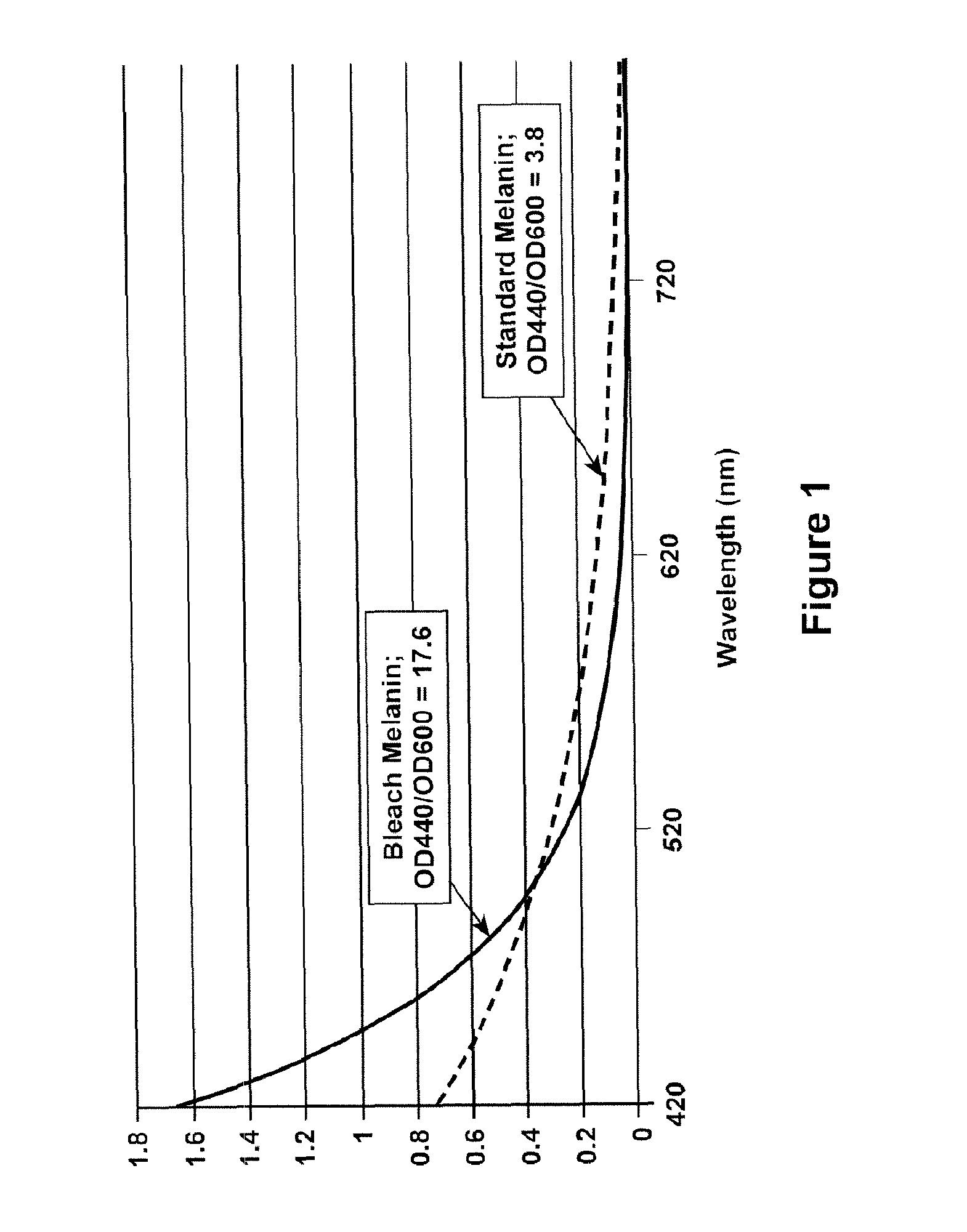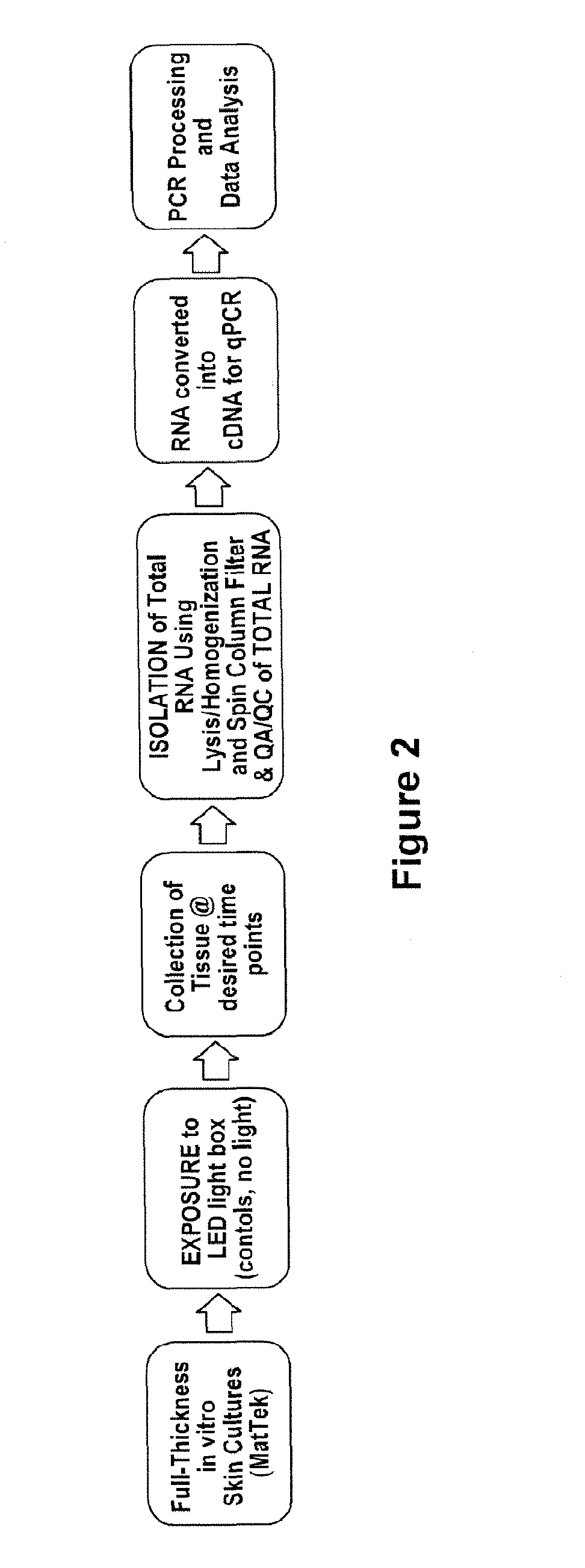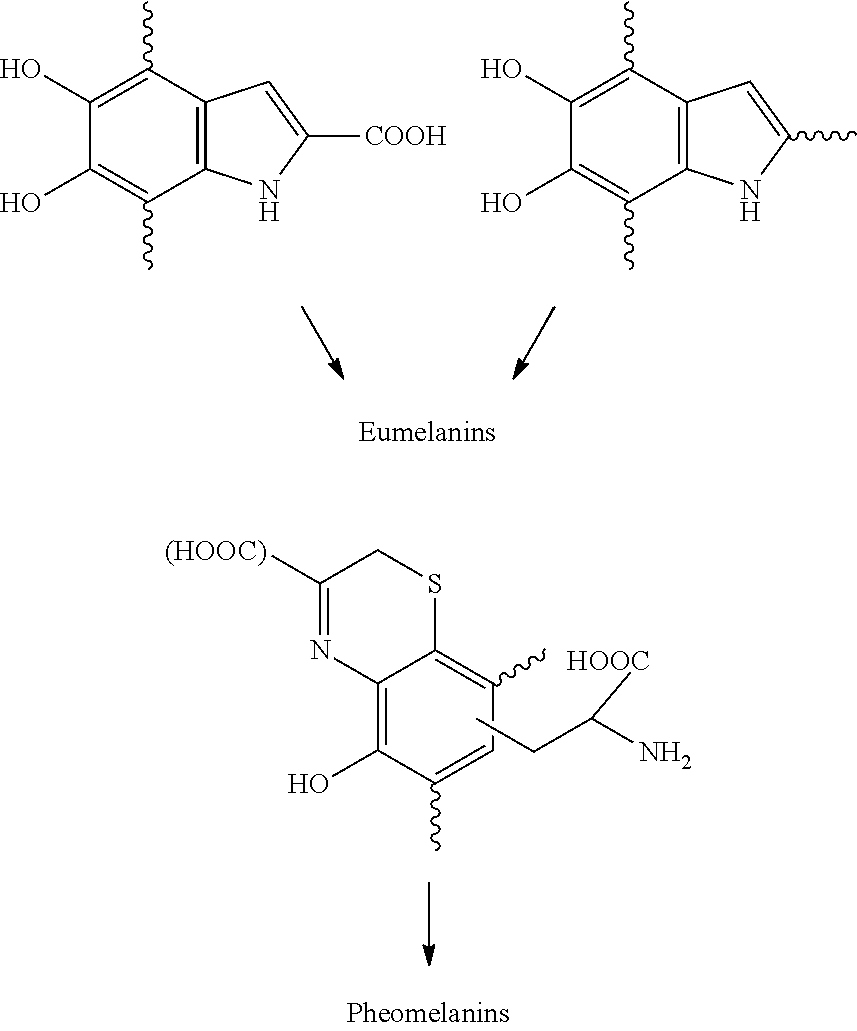Compound, composition, and method for protecting skin from high energy visible light
a technology of visible light and compound, applied in the field of melanin derivative, can solve the problems of increasing the risk of wrinkles, age spots, skin sagging, undesirable biochemical changes, etc., and achieve the effect of stabilizing the sensitive compound
- Summary
- Abstract
- Description
- Claims
- Application Information
AI Technical Summary
Benefits of technology
Problems solved by technology
Method used
Image
Examples
example 1
a) Synthesis
[0042]The melanin was synthesized as follows: 15 g of L-tyrosine was dissolved in 800 mL of water; 60 g of ammonium persulfate was dissolved in 200 mL of water; 26 g of sodium hydroxide (NaOH) was dissolved in 50 mL of water. The pH was adjusted to 8.5 with sodium hydroxide and the solution stirred for 10 hours.
b) Purification
[0043]While stirring, the product was acidified with hydrochloric acid (HCl) to pH 1.5 using approximately 1 L of water. Continue stirring for about 10 minutes and remove stirrer and allow the product to stand for 24 hours. Separate the supernatant; add about 1 liter of deionized water and adjust the pH to 2 with dilute hydrochloric acid while stirring for 10 minutes; allow the product to stand for 24 hours without stirring.
[0044]Raise the pH to between 3 and 4 while stirring for about 1 hour using sodium hydroxide, stop stirring and allow the product to stand for 24 hours. Separate the supernatant or capture the supernatant by filtr...
example 2
Emulsion Formulation
[0115]
SEQUENCE1)PERCENTINGREDIENTINCI NAME183.94Deionized WaterWater10.10Disodium EDTADisodium EDTA10.11CARBOPOL ® Ultrez 10 (2)Carbomer20.10Keltrol CGXanthan Gum21.00Preservative32.75LIPO ® GMS 450 (1)Glyceryl Stearate31.25LIPOCOL ® C (1)Cetyl Alcohol31.00LIPOPEG ® 39-S (1)PEG-40 Stearate30.50LIPOWAX ® P (1)Cetearyl Alcohol (and)Polysorbate 6038.00LIPONATE ® GC (1)Caprylic / Capric Triglyceride40.25NaOH (18% Sol.)Sodium Hydroxide51.00Aqueous solution of a MelaninDerivative (10% Active)100.00(1) Lipo Chemicals, Inc.(2) LubrizolViscosity of approximately 20,000 cps1)Premixes and order of addition of composition ingredients.
example 3
Gel Formulation
[0116]
SEQUENCE1)PERCENTINGREDIENTINCI NAME175.98Deionized WaterWater20.10Disodium EDTADisodium EDTA220.00CARBOPOL ® 980 (2% Sol.) (2)Carbomer21.00LIPONIC ® EG-1 (1)Glycereth-2630.92Sodium Hydroxide (18% Sol.)Sodium Hydroxide41.00Preservative51.00Aqueous solution of a MelaninDerivative (10% Active)100.00Viscosity of approximately 20,000 cps
[0117]The following formulations also can contain greater amounts of the melanin derivative (added as a 10% by weight aqueous solution), as needed or desired.
SEQUENCE1)PERCENTINGREDIENTINCI NAME172.24Deionized WaterWater12.50Glycerin (119)Glycerin10.25Xanthan GumXanthan Gum25.00LIPOMULSE ® Luxe (1)Cetearyl Alcohol (and) GlycerylStearate (and) PEG-40 Stearate(and) Ceteareth-20220.00LIPOVOL ® MOS-130 (1)Tridecyl Stearate (and) TridecylTrimellitate (and)DipentaerythritylHexacaprylate / Hexacaprate3q.s.Preservative40.1Melanin Derivative100.00(1) Lipo Chemicals, Inc.
[0118]In the main kettle, combine Sequence 1 ingredients and heat to 78-80....
PUM
| Property | Measurement | Unit |
|---|---|---|
| molecular weight | aaaaa | aaaaa |
| optical density | aaaaa | aaaaa |
| wavelengths | aaaaa | aaaaa |
Abstract
Description
Claims
Application Information
 Login to View More
Login to View More - R&D
- Intellectual Property
- Life Sciences
- Materials
- Tech Scout
- Unparalleled Data Quality
- Higher Quality Content
- 60% Fewer Hallucinations
Browse by: Latest US Patents, China's latest patents, Technical Efficacy Thesaurus, Application Domain, Technology Topic, Popular Technical Reports.
© 2025 PatSnap. All rights reserved.Legal|Privacy policy|Modern Slavery Act Transparency Statement|Sitemap|About US| Contact US: help@patsnap.com



